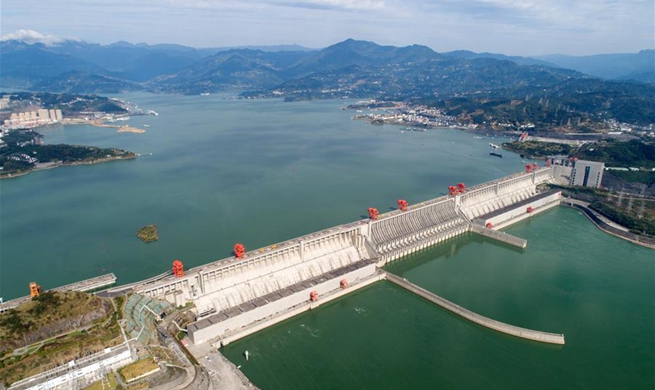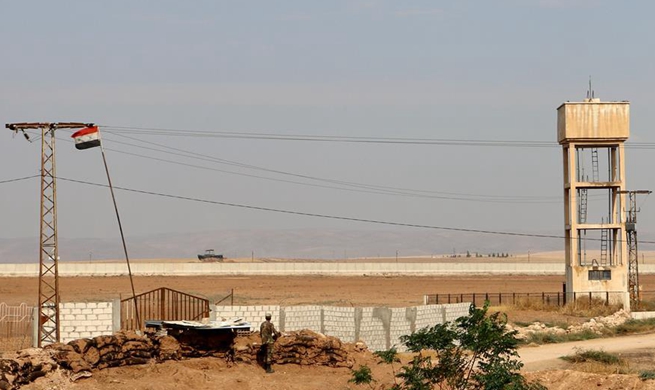by Keren Setton
JERUSALEM, Oct. 28 (Xinhua) -- U.S. President Donald Trump's top adviser Jared Kushner met with Israeli Prime Minister Benjamin Netanyahu in Jerusalem on Monday.
Kushner arrived in the region to discuss his plan for brokering peace between Israelis and Palestinians and discussing regional developments.
He also visited to gage the rocky Israeli political environment, which will have direct impact on his ability to roll out the plan.
The plan has been in the works since the start of the Trump administration in 2017, but has not yet been published, leaving much room for speculation on its contents.
Publication of the full plan has been repeatedly delayed, also due to political developments in Israel. Prime Minister Benjamin Netanyahu has been heading an interim government since the beginning of 2019. The two recently held elections have yet to solve the political deadlock in the country.
As coalition talks in Israel are underway, Kushner also met with the leader of the Blue and White party Benny Gantz. Gantz is currently tasked with trying to form a government and should he succeed, he will replace Netanyahu.
The timing is therefore, perhaps the most significant part of Kushner's visit.
"He is here to evaluate where the wind is blowing in Israeli politics, in terms of the possibility of when to publish the plan," said Ofer Zalzberg, a senior analyst on Israeli-Palestinian affairs in the International Crisis Group. "This is why he met with both Netanyahu and Gantz."
"It's hard to imagine they would have substantive conversations at this stage, but at least there is a direct tie that has been established," said Gerald Steinberg, a professor with the Political Science department of the Bar-Ilan University.
In a recent interview given to an Israeli media outlet, U.S. Ambassador to Israel David Friedman said the peace plan would be released shortly after an Israeli government is formed. But the White House did not confirm it.
"It seems there is a discourse within the administration on the timing of the publication and whether this should be influenced by the make-up of the Israeli government," Zalzberg told Xinhua.
Netanyahu and Trump are close allies. Netanyahu made a campaign promise to his electorate that he would annex large parts of the West Bank and said he would do so in coordination with the Trump administration.
As Palestinians see the West Bank as the bulk of the territory that will make up their future state, the promise is highly controversial and it is unclear whether the American leadership will actually support it. However, it is believed that the Kushner's plan will not force Israel to make far-reaching concessions in the West Bank.
The distance between Gantz and Netanyahu on the peace process and defense issues is not that great, but Blue and White party did voice their opposition to a blanket annexation of the West Bank. Should the next Israeli prime minister not be Netanyahu, this could have major impact on the potential of the plan to succeed.
Regardless of the identity of Israel's next leader, the Palestinians are absent from the process which relates directly to them.
There is a complete refusal to cooperate with the Trump administration on their side. Palestinian President Mahmoud Abbas has boycotted the White House since Trump recognized Jerusalem as Israel's capital.
"There is no longer direct contact between the Palestinians and the American government," said Zalzberg. "Therefore they are less able to influence the content of the plan."
"The Palestinian leadership hopes that the plan will not be published at all," he added. "They hope that the coalition crisis in Israel will force Trump to wait until his second term, should he be re-elected."
The plan, which remains a mystery, is believed to deal with political and economic aspects of the conflict. In June 2019, Kushner revealed his economic vision. Entitled "Peace to Prosperity," it calls for multi-billion-dollar investment in infrastructure and business projects in the Palestinian territories.
The timing of the Kushner visit is not only related to Israeli politics. In recent weeks, as the United States announced its withdrawal from northwestern Syria, there has been public disapproval by senior Israeli officials.
"He is also here to keep open communication channels with the Israeli government, especially in a time when there is criticism toward the administration that it does not support its Middle Eastern allies," Zalzberg said. "It is part of a wider effort to do damage control.
According to Steinberg, as the U.S. scales down its presence in the Middle East, the chances of a successful peace plan are reduced accordingly.
"Leaving Russia, Turkey and Iran as the main powers, it is going to be very hard for Israel to take risks," he said. "Any peace plan, even one from the Trump administration, is likely to require risk taking."

















